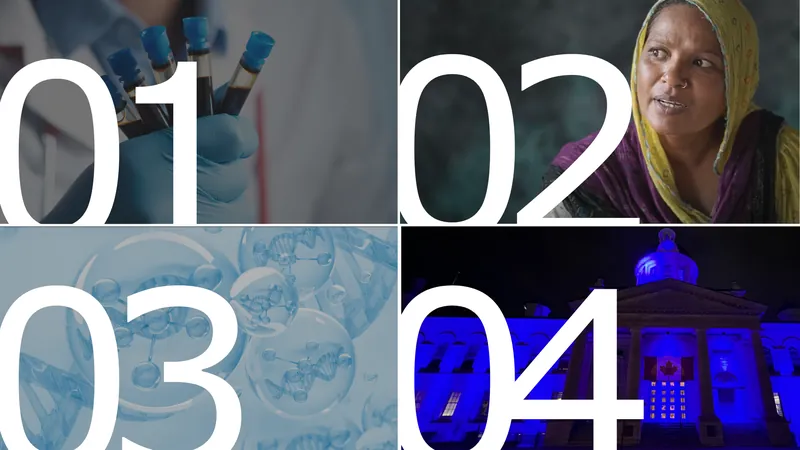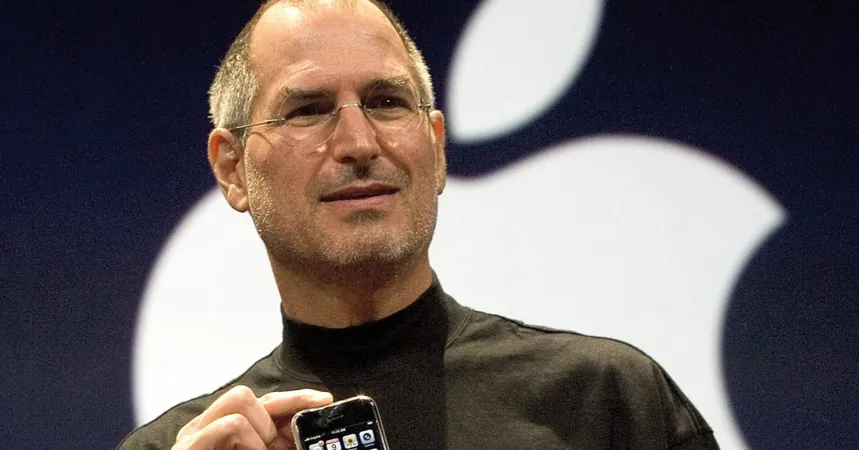
Four Groundbreaking Innovations That Could Revolutionize Health Research
2025-04-03
Author: Michael
Changing the Odds for Early Ovarian Cancer Detection
Ovarian cancer is a silent killer, often diagnosed far too late due to its subtle and non-specific symptoms. Alarmingly, up to 75% of cases are detected during late or terminal stages, contributing to its status as one of the most deadly forms of cancer for women. However, new hope is on the horizon.
Researchers at Queen's University, led by Dr. Chris Mueller and graduate student Sydney Shepherd, are pioneering a promising blood test named mDETECT. This test detects ovarian cancer by analyzing changes in DNA, and it has already shown effectiveness in identifying late-stage ovarian cancer and certain breast cancer markers. Thanks to generous funding from Ovarian Cancer Canada, the team is gearing up for a pivotal phase of research by trialing mDETECT at Sunnybrook Hospital. This trial will involve women presenting with vague symptoms to compare the test's performance against existing diagnostic measures.
Dr. Mueller emphasizes the importance of this research phase, stating, "This is the critical step—translating our lab discoveries into real patient care. Early detection is paramount. Detecting ovarian cancer sooner means better outcomes and the potential to save more lives."
Breaking the Silence Around Mental Health During Pregnancy
While pregnancy is often adorned with images of joy and glow, the reality is starkly different for many. Approximately one in three individuals experience depression or anxiety during pregnancy, yet stigma often shrouds these struggles, leaving many without necessary support.
Dr. Shahirose Premji seeks to illuminate this critical issue. By collaborating with filmmakers in Kenya, Pakistan, and India, she tells the authentic stories of pregnant women grappling with mental health challenges. These narratives aim to foster broader conversations around mental health in pregnancy, proving that raising awareness can be the first step toward seeking help.
Aging Blood Cells as Potential Weapons Against Cancer
Immunotherapy has transformed cancer treatment, but its efficacy is restricted to a subset of patients. Researchers are now focusing on biomarkers—indicators that can predict treatment success improving personalization within therapies.
Among these innovators is Marco Buttigieg at Queen's University, who has identified a potential biomarker known as clonal hematopoiesis (CH). This phenomenon occurs as our blood cells age, accumulating mutations that can lead to increased inflammation and worse cancer outcomes. Present in 20-30% of patients with solid tumors, CH is not currently screened for as a biomarker, but Buttigieg’s findings could pave the way for more personalized and effective immunotherapy treatments in the future.
Bringing Essential Care to the Overlooked
Not all health research is confined to laboratories; some vital work is focused on ensuring that marginalized populations receive the care they deserve. Dr. Oyedeji Ayonrinde leads the Cancer and Severe Mental Illness Project (CaSMIP), targeting the glaring gaps in cancer care for individuals with severe mental illnesses, such as schizophrenia and bipolar disorder.
Ayonrinde’s research highlights that these individuals are less likely to receive timely screenings or accurate diagnoses, often due to stigma surrounding mental health. To address this, CaSMIP recently launched a colorectal cancer awareness initiative—complete with creative campaigns including painting fingernails blue and lighting up Kingston City Hall in blue light. Their efforts aim not only to increase awareness but also to promote equity in healthcare, dismantle stigma, and ensure that no one is overlooked in the fight against cancer.
In conclusion, these groundbreaking studies and initiatives signal a new dawn for health research, potentially transforming lives by promoting early detection, breaking mental health stigma, and ensuring equitable access to care for all. With ongoing support and innovation, there's every reason to believe in a brighter future for health research.









 Brasil (PT)
Brasil (PT)
 Canada (EN)
Canada (EN)
 Chile (ES)
Chile (ES)
 Česko (CS)
Česko (CS)
 대한민국 (KO)
대한민국 (KO)
 España (ES)
España (ES)
 France (FR)
France (FR)
 Hong Kong (EN)
Hong Kong (EN)
 Italia (IT)
Italia (IT)
 日本 (JA)
日本 (JA)
 Magyarország (HU)
Magyarország (HU)
 Norge (NO)
Norge (NO)
 Polska (PL)
Polska (PL)
 Schweiz (DE)
Schweiz (DE)
 Singapore (EN)
Singapore (EN)
 Sverige (SV)
Sverige (SV)
 Suomi (FI)
Suomi (FI)
 Türkiye (TR)
Türkiye (TR)
 الإمارات العربية المتحدة (AR)
الإمارات العربية المتحدة (AR)